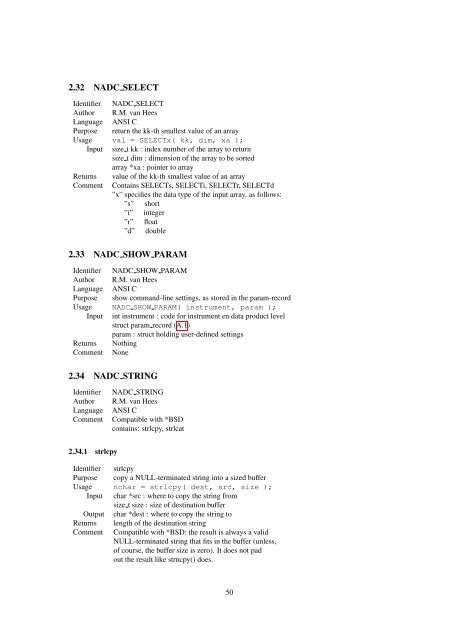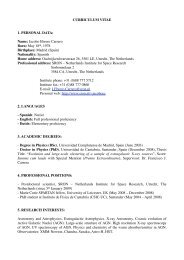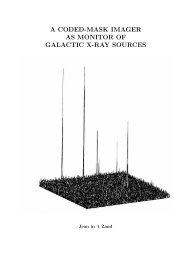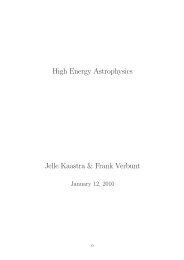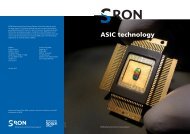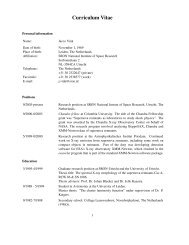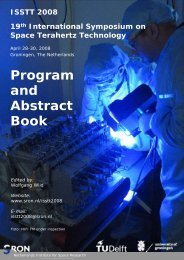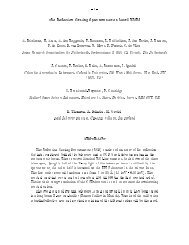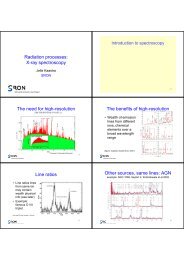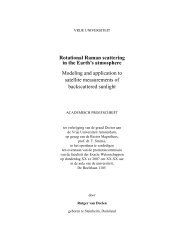Reference Manual of the nadc-tools API and Libraries - SRON
Reference Manual of the nadc-tools API and Libraries - SRON
Reference Manual of the nadc-tools API and Libraries - SRON
Create successful ePaper yourself
Turn your PDF publications into a flip-book with our unique Google optimized e-Paper software.
2.32 NADC SELECT<br />
Identifier NADC SELECT<br />
Author R.M. van Hees<br />
Language ANSI C<br />
Purpose return <strong>the</strong> kk-th smallest value <strong>of</strong> an array<br />
Usage val = SELECTx( kk, dim, xa );<br />
Input size t kk : index number <strong>of</strong> <strong>the</strong> array to return<br />
size t dim : dimension <strong>of</strong> <strong>the</strong> array to be sorted<br />
array *xa : pointer to array<br />
Returns value <strong>of</strong> <strong>the</strong> kk-th smallest value <strong>of</strong> an array<br />
Comment Contains SELECTs, SELECTi, SELECTr, SELECTd<br />
”x” specifies <strong>the</strong> data type <strong>of</strong> <strong>the</strong> input array, as follows:<br />
”s” short<br />
”i” integer<br />
”r” float<br />
”d” double<br />
2.33 NADC SHOW PARAM<br />
Identifier NADC SHOW PARAM<br />
Author R.M. van Hees<br />
Language ANSI C<br />
Purpose show comm<strong>and</strong>-line settings, as stored in <strong>the</strong> param-record<br />
Usage NADC SHOW PARAM( instrument, param );<br />
Input int instrument : code for instrument en data product level<br />
struct param record (A.1)<br />
param : struct holding user-defined settings<br />
Returns Nothing<br />
Comment None<br />
2.34 NADC STRING<br />
Identifier NADC STRING<br />
Author R.M. van Hees<br />
Language ANSI C<br />
Comment Compatible with *BSD<br />
contains: strlcpy, strlcat<br />
2.34.1 strlcpy<br />
Identifier strlcpy<br />
Purpose copy a NULL-terminated string into a sized buffer<br />
Usage nchar = strlcpy( dest, src, size );<br />
Input char *src : where to copy <strong>the</strong> string from<br />
size t size : size <strong>of</strong> destination buffer<br />
Output char *dest : where to copy <strong>the</strong> string to<br />
Returns length <strong>of</strong> <strong>the</strong> destination string<br />
Comment Compatible with *BSD: <strong>the</strong> result is always a valid<br />
NULL-terminated string that fits in <strong>the</strong> buffer (unless,<br />
<strong>of</strong> course, <strong>the</strong> buffer size is zero). It does not pad<br />
out <strong>the</strong> result like strncpy() does.<br />
50


